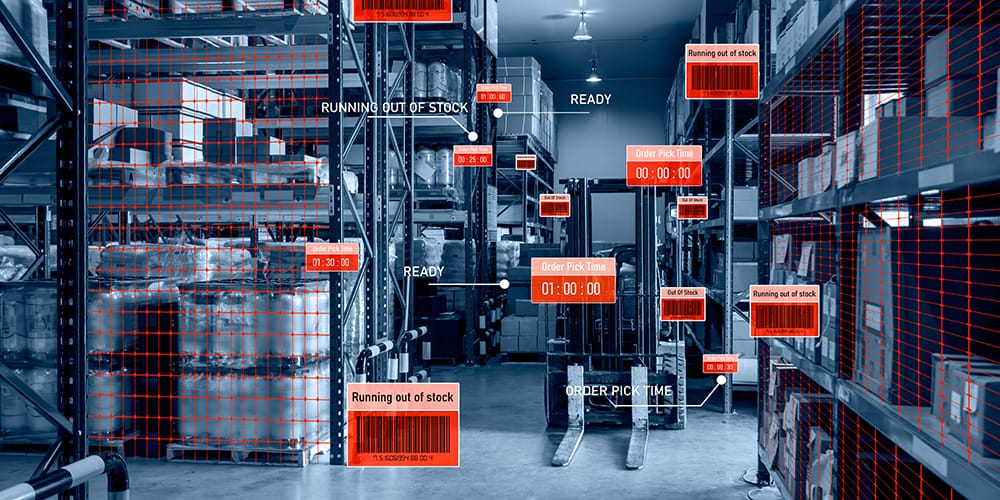
Harnessing IoT, AI, and ML for Efficient and Innovative SCM: Optimizing Supply Chains with Microsoft Dynamics …
Digital transformation has an impact on every industry across the globe, but opportunities follow in its wake. That’s also the case with manufacturing companies.
By leveraring digital technologies such as the Internet of Things (IoT) and artificial intelligence (AI) manufacturers can optimize their supply chains, improve operational efficiency and drive innovation.
In this blog post we’ll dive into how Microsoft Dynamics 365 Supply Chain Management can help businesses to leverage digital technologies such as IoT, AI and Machine learning to optimize their supply chains, improve efficiency and speed, and drive innovation.
IoT integration improves efficiency
Microsoft Dynamics 365 Supply Chain Management can integrate with IoT devices and sensors to provide real-time supply chain visibility and improve operational efficiency helping optimising supply chain operations and reducing costs.
According to René Reinli, General Manager at AlfaPeople Germany, the integration enables organisations to make informed decisions and respond quickly to changes in demand, inventory levels and other factors that impact their supply chain operations.
“Even though the initial investment in an IoT solution might be costly the benefits will in the longer term benefit large manufacturing companies if they understand what it is they wnat out of it,” he says.
Essentially an IoT integration with Microsoft Dynamics 365 Supply Chain Management helps manufacturing companies gain insights into their supply chain operations, reduce costs associated with their manual processes and optimise their logistics operations.
Leverage AI with Dynamics
Another powerful digital technology that Microsoft Dynamics 365 Supply Chain Management can help manufacturers leverage is AI. The system leverages AI in several ways to help businesses optimise their supply chain operations and drive growth and succes:
- Improve decision-making: AI helps manufacturers by providing real-time insights and recommendations based on historical data, enabling businesses to make informed decisions about their supply chain operations.
- Enhance predictive maintenance: AI helps businesses to enhance predictive maintenance, reducing downtime and maintenance costs and improving overall equipment reliability.
- Streamline operations: AI helps companies to streamline their operations by automating routine tasks and reducing manual effort.
- Optimize inventory management: AI helps businesses to optimize their inventory management, reducing waste and overstocking, and improving lead times.
- Improve forecasting and planning: AI helps manufacturing companies to make more accurate predictions about future demand, production schedules, and delivery times, allowing them to proactively manage their supply chain operations.
However, René Reinli points out that it’s important to make sure, that you as a company have access to enough data before you begin investing ressources in AI.
“The biggest problem for most companies that are willing to work with AI is that company alone does not have enough data prepared to train the AI. So the capability of the integration between AI and Microsoft Dynamics 365 Supply Chain Mangement is essentially based on the ability of the business to collect enough data,” he says.
Automation brings significant value
Automation is also a digital technology that can bring significant value to manufacturing companies by streamlining and optimising supply chain operations.
Microsoft Dynamics 365 Supply Chain Management is able to support automation efforts in most businesses especially in the manufacturing industry, René Reinli explains.
“A good example is that automation helps one of our clients, a house manufacturer, generate parts lists. It enables him fully automise the generation of parts lists that are used to build the houses that customers order,” he says.
Other than increased efficiency, automation with Microsoft Dynamics 365 Supply Chain Management also improves accuracy, increases processing time, improves customer service and reduces costs.
Mitigate disruptions with a digital twin
Finally it’s worth mentioning the digital twin functionality in Microsoft Dynamics 365 Supply Chain Management.
The digital twin functionality in Microsoft Dynamics 365 Supply Chain Managment enables businesses to simulate different scenarios and make informed decisions about their supply chain operations by creating a virtual representation of the supply chain.
“This makes manufacturers capable of identifying problem when introducing new production processes or new products into existing production operations and thereby mitigating potential disruptions to the business,” René Reinli says.
Are you finding it more difficult to gain insight into the costs associated with activities along your supply chain? Read this blog post to learn more about how you can manage you cost and make you supply chain more effective.





